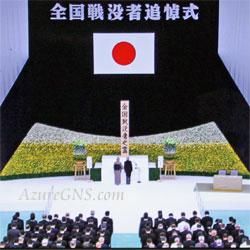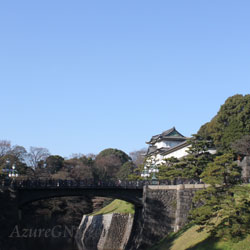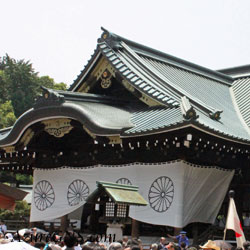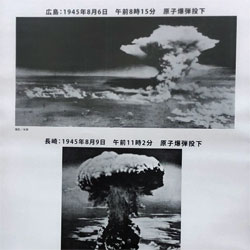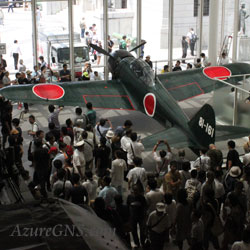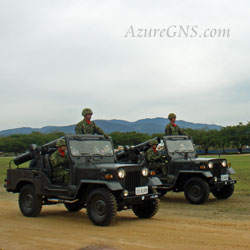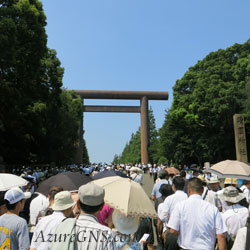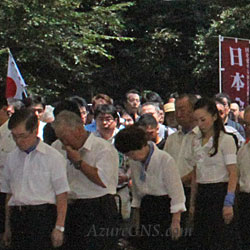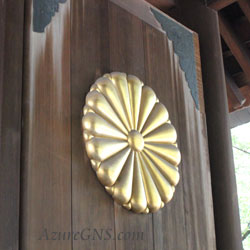(8月15日)
Shusen-no-hi;
The Anniversary of the End of World War ll
(August 15th)
●終戦の日 Shusen-no-hi; the Anniversary of the End of World War ll
●終戦記念日 Shusen-kinenbi
●戦争 war
●アジア太平洋戦争 the Asia-Pacific War; the War in Asia and the Pacific
●第二次世界大戦 World War ll
●終戦 war end; end of the war; termination of the war
●降伏 surrender
●敗戦 the loss of a battle; defeat
●敗戦国 defeated country; defeated nation; loser
●戦勝国 victor (country); victor (nation); victorious country; victorious nation
●休戦;停戦 cease-fire; truce
●和平工作 peace move; peace movement; peace overture
●調停 mediation
●戦争賠償 war reparations
●占領軍 occupation forces; forces of occupation; forces of the occupying power
●軍国主義 militarism
●平和 peace
◆1945年(昭和20年)8月15日の玉音放送によって日本の国民は日本の敗戦とアジア太平洋戦争の終結を知ります。
On August 15th (Showa 20th yr), through a live broadcast speech by the Emperor, the Japanese people learned of their defeat and of the end of the Asia-Pacific War.
◆国民はこの時初めて天皇の肉声をNHKのラジオ放送によって聞きました。
At that time, the Japanese nation heard the Emperor’s voice for the first time, through an NHK radio broadcast.
◆敗戦を知った時、多くの国民が嘆き悲しみ、自らの命を絶つ者さえいました。
A large number of people were grief-stricken when they heard the news, and some even committed suicide.
◆この日、8月15日を日本では一般にアジア太平洋戦争の終戦の日、または終戦記念日としています。
This day, August 15th is generally recognized as Shusen-no-hi or Shusen-kinenbi, the Anniversary of the end of the Asia-Pacific War.
◆7月17日にドイツのベルリン郊外のポツダムにアメリカ大統領トルーマン、イギリス首相チャーチル、ソ連書記長のスターリンが集まり首脳会議が始まりました。
On July 17th, the President of the United States, Harry S Truman, the Prime Minister of Britain, Sir Winston Churchill, and the Secretary-General of the Soviet Union, Iosif Vissarionovich Stalin, conducted a summit conference, at Potsdam, in the suburbs of Berlin.
◆7月26日に日本に無条件降伏、軍国主義全廃、民主主義確立を求めるポツダム宣言が発表されました。
On July 26th, the Potsdam Declaration was announced; it demanded Japan’s unconditional surrender, the total abolition of militarism, and the establishment of a democracy.
◆同28日に日本政府は一旦これを「黙殺」する、言い換えれば「少しの間検討する」と表明しました。
On the 28th day of the same month, the Japanese government declared “silence” for the moment, in other words, “some time to think it over”.
◆しかし日本語の「黙殺」は「無視」、つまり「宣言に反対」と誤訳されました。
However, the Japanese term for “silence” was mistranslated as “ignore”, or “disapproval of the Declaration”.
◆これが8月6日の広島への原爆投下、9日の長崎への原爆投下へと繋がります。
This led to the release of the atomic bomb on Hiroshima on August 6th and on Nagasaki on August 9th.
◆日本政府は不可侵条約を結んでいたソ連に和平の斡旋を依頼していました。
The Japanese government had asked the Soviet Union to arrange for peace negotiations: they agreed to a nonaggression treaty.
◆しかしその頼みの綱のソ連が8月8日に対日宣戦を通告、翌日中国の日本軍に大規模の攻撃をかけました。
On August 8th, however, the Japanese government’s only hope, the Soviet Union, declared war on Japan, and the following day, it made a violent attack on the Japanese military in China.
◆日本政府はこのままでは日本は完全に壊滅してしまうと考え、日本を救うため、8月14日にポツダム宣言受諾の苦渋の選択を下しました。
On August 14th, the Japanese Government made a desperate decision to accept the Potsdam Declaration, in order to save Japan; otherwise, Japan would be completely destroyed.
◆8月15日に戦争を終わらせるという決断が国民に発表されました。
On August 15th, the decision to end the war was announced to the nations.
◆8月28日には40万人の占領軍が先遣隊として厚木に到着しました。
On August 28th, the occupation army, numbering 400 thousand soldiers, arrived at Atsugi as the advance party.
◆米軍のダグラス・マッカーサー元帥が最高司令官でした。
The American General, Douglas MacArthur, was the supreme commander.
◆9月2日に米戦艦ミズーリ号上で降伏文書の調印式が行われました。
On September 2nd, the Capitulation was signed on the Missouri, an American battleship.
◆300万人以上の日本人がこの大戦で命を失いました。
More than 3 million Japanese people lost their lives during the war.
◆それと同時に日本軍はアジアを中心に多くの人々の命を奪いました。
The Japanese military equally killed a great number of people, the majority being in Asia.
◆現在、日本では自衛隊の海外派遣問題が議論されています。
Due to recent events, sending Japanese Self-Defense Forces abroad has become a controversial issue.
◆時代の流れと共に、国際貢献と平和憲法について論議しなければいけません。
Times are changing; international contribution and the Peace Constitution are matters that need to be discussed.
◆戦争被害者からの戦後補償要求の問題もまだ解決されていません。
The problem of the postwar compensation claim of war victims has not yet been resolved.
◆毎年、終戦記念日に日本の政府の高官が靖国神社に参拝することが問題になります。
Every year, on the anniversary of the end of World War ll, some high officials of the Japanese government worship at Yasukuni Shrine.
◆そこには亡くなった兵士が神として奉られています。
There, the souls of the deceased soldiers are worshiped like gods.
◆その参拝は戦争の正当化に繋がるとしばしば国内外で批判されます。
This tradition is often criticized, both in Japan and abroad, as it seems to justify war.
◆日本人は被害者であると同時に加害者でもあることを忘れてはいけないでしょう。
It is important to realize that Japanese people were assailants as well as victims.
◆過去に犯した同じ過ちを繰り返さないように、戦争ではなく世界平和のため、努力をしていかなければいけません。
Let us try not to repeat the same mistakes we have made in the past, and instead of war, look towards world peace.
Copyright (C) Azure Global Network Services. All Rights Reserved.
